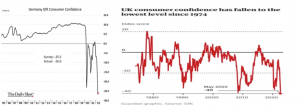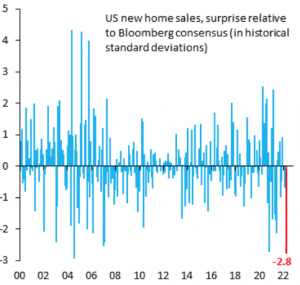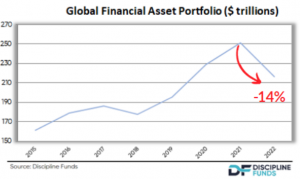Careful what you wish for is the old adage. So, spare a thought for the Daily Express social media team who took a break from culture wars and refugee bashing to save Big Dog? Yep, the Boris Johnson cheerleader-in-chief thought it would be a good idea to capitalise on Fat Boy Dim’s escape from a Sue Gray skewering to conduct a poll on Twitter. The absence of a “smoking gun” in Sue Gray’s report on serial partying, wine-time-Fridays, karaoke machines and the walls of 10 Downing Street spattered with red wine and vomit seemed to have prompted the brave polling query, “Should Boris Johnson resign after #SueGray’s report into lockdown parties?”. Oh dear. The crushing response from 97% of the 31,000 responses was “YES” and suggests that the Ministry of Sound-bites’ wish for everyone to “move on” has triggered a far more challenging movement. In a similar, but more serious vein, one senses that the mainstream media is screaming for a recession. Again, careful. Let’s check the data in a few charts….
In a European context, the consumer is definitely losing confidence. The following charts(via The Daily Shot/WSJ and The Guardian) from Europe’s powerhouse economy, Germany, and the UK are illustrative, including an almost 50-year low in Boris-stan:

It’s not just Europe. In the US, where it’s easier to buy a gun than to buy baby milk formula, the Biden presidency is enduring a record low 36% approval rate as inflation rips and monetary authorities scramble. The Fed has been relatively aggressive in using interest rate hikes to counter inflation and dampen economic activity. And, one key sector is cooling dramatically. The US housing market in its new home sales data this week is experiencing the rapid impact of higher mortgage rates. In fact, the negative surprise of a 27% decline in home sales (per Bloomberg) is almost 3 standard deviations from normal and the following chart suggests we are in Covid or sub-prime crisis(2007-2008) shock territory.

The charts above are a reasonable example of a problem(inflation) requiring a solution wish(cool the economy) with an action(higher interest rates) which results in a “careful what you wish for” outcome(potential asset price declines). Of course, housing markets globally are holding up pretty well but financial markets have been taking some serious pain across major equity indices(S&P 500), technology stocks(Nasdaq), crypto(Luna) and bond/debt markets. The slightly contrarian view might be that some asset price deflation might not necessarily be a bad thing. Consider the plight of the youth today trying to fund housing, education, pensions and child care. Arguably, this is the worst pricing entry-point in history for those attempting to build a life, savings or family. The following chart showing $35 trillion worth of wealth destruction in recent months looks monstrous but in percentage terms the damage is less scary at 14% of total assets.

We have documented many times over the past few years that income inequality is at its most stretched since the 1930s. Even the wealthy acknowledge this gap as unsustainable. While a rapid uncontrolled unwind of asset prices would not be a good thing, we should note the following:
- Financial markets typically discount(forecast) risks 6-9 months in advance of hyperbolic newspaper headlines. We are already in the 6th or 7th month of asset prices falling so we might be closer to the end than the beginning in market declines.
- Understand the difference between economic activity and consumer confidence. For example, in 2020 as Covid-19 raged, Ireland managed to clock up positive annual GDP growth despite the fact that at some points during the year up to 700-800,000 of the workforce were unable to work and worried. Now think of a reverse scenario where growth is disappointing but consumers feel better. Sound mad? Ask the Japanese and Swiss over the past 20 years.
- The share prices of Wal-Mart, Target or Snapchat falling by 20-40% in a single day may sound bad but remember 90% of the US population owns just 11% of the US equity markets but account for 80% of spend ie the top 10% are the ones mostly affected by asset price declines but don’t really move the dial on daily economic activity/spend. Let’s just say central banks care much more about the 90% this time. For illustration, the top 50 wealthiest people in the world have seen their fortunes decline by half a trillion(!) dollars in recent months but this enormous figure still doesn’t match the gains in wealth achieved through the pandemic. Tiny violins required….
Sadly, any sort of re-balancing could entail some short term pain for everyone. Nobody likes slow-downs or technical recessions, including board rooms, and there are already signs that main street will have to cope with job losses. Lay-offs at Klarna, PayPal and Netflix are indicative of technology growth rates and valuations hitting the skids but, again, there are two important points to make if we believe an economic re-set is well overdue:
- Interest rates held at artificially low levels since the credit crisis encouraged increased risk taking and poor capital allocation decisions. Not long ago there were $15 trillion worth of negatively yielding bonds sitting in investment portfolios. This unattractive rate of return forced investment capital to find higher returns in riskier ventures – see Luna and its ‘Lunatics’ being promised 20% “yield”. Most would agree that a realignment of investment capital, risks and returns would be a long-term positive development.
- The technology sector and its attractive wealth growth opportunities are an obvious scapegoat for the inflationary labour shortages experienced by many sectors in the economy from healthcare to hospitality. However, do not underestimate the impact on labour markets from early retirements, the crypto/NFT creator economy and self-employment/start-ups. Everything seemed to be rocketing in business, tech and financial markets except main street employee wages.
Now, whisper it carefully but… current market forces could possibly deliver wage inflation. Typically, this would alarm central banks and governments as this could set off an inflationary spiral where higher wages begets higher prices, begets higher wages….prices…. and rinse, repeat. However, monetary authorities and governments have only recently conducted the biggest fiscal experiment in history by handing people trillions of dollars in wage subsidies, direct cash transfers, Covid relief payments etc and guess what? In the vast majority of cases people spent the incremental dollars in their accounts, maintained the flow of money, and helped economies avoid GDP implosions during the pandemic.
We should note that this global economy is not like those of 1974 or 1981. Labour mobility, cloud infrastructure, asset-lite business models and de-unionization of the workforce means the overall economy is more dynamic and agile. Do not presume wage rises are a multi-year phenomenon destined to kill business and trigger a prolonged recession. Rather think re-set.. as not wishful thinking….









